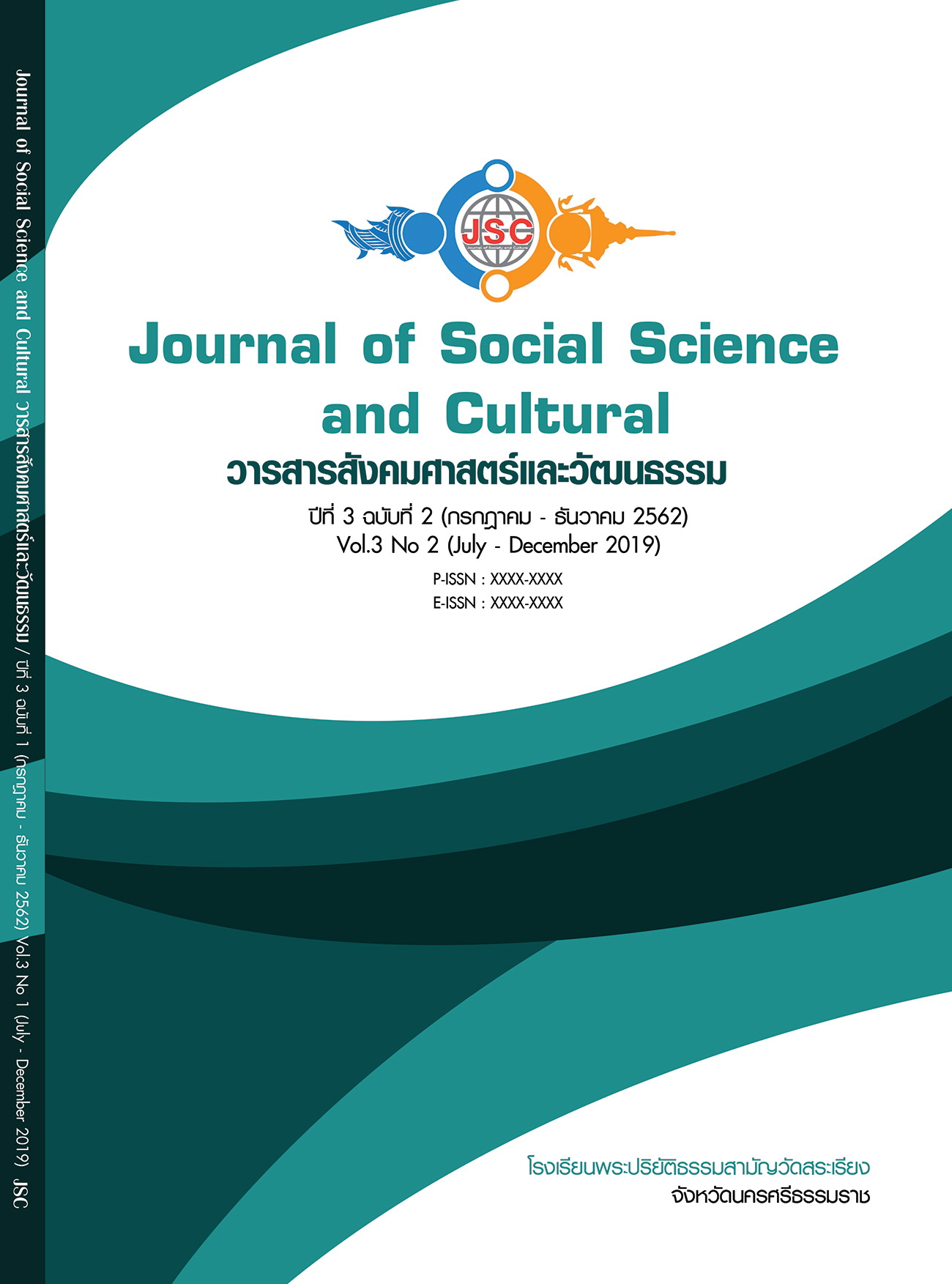AN ANALYSIS OF THE APPLICATION OF BUDDHIST PRINCIPLES IN THE VOLUNTEER WORK OF THE WAT SAKAET COMMUNITY, MUANG DISTRICT, SONGKHLA PROVINCE
Main Article Content
Abstract
The purposes of this research were: 1) study the concept and theory of volunteer spirit and the principle of volunteer work, 2) investigate the Dharma principles of volunteer work in Theravada Buddhist scriptures, and 3) analyze the application of Dharma principles in the volunteer work of Wat Sakaet community, Muang district, Songkhla province. The study was quantitative research method by the document and in-depth interviews. Select purposive sampling group to represent people with volunteer work of Wat sakaet community, Muang district, Songkhla province, divided into 3 groups include: 1) local leadership, 2) community leadership, and 3) ordinary for total 9 persons. By analyzing the content and summarizing The research was found that: 1) The concept and theory of volunteer spirit are: creating the motivation of volunteer work. This is caused by both internal and external motives that create a driving force. Or as a driving force in the suffering of others Causing a sacrifice and a desire to help others from suffering, 2) The Dharma principle of volunteer were 6 Saraniyadhamma (virtues for fraternal living) such as: 2.1) Mettàkàyakamma (to be amiable in deed), 2.2) Mettàvacikamma (to be amiable in word), 2.3) Mettàmanokamma (to be amiable in thought), 2.4) Sàdhàranabhogità (to share any lawful gains with virtuous fellows), 5) Silasàmannatà (to keep without blemish the rules of conduct along with one’s fellows), and 6) Ditthisàmannatà (to be endowed with right views along with one’s fellow). And 3) To analyze the application of Dharma principles in the volunteer by changing the way of thinking to stimulate the ideas of the community correctly that was to develop wisdom the mselves, be aware of all things as truly that related to the development of life so effective to the attitude towards things, as the overview of result was sustainable volunteering behavior in their lives and society.
Article Details
References
กลุ่มผู้นำท้องถิ่น. (9 ตุลาคม 2563). การประยุกต์ใช้หลักพุทธธรรมในการทำงานจิตอาสาของชุมชนวัดสระเกษ อำเภอเมือง จังหวัดสงขลา. (พระสถาพร ปุณฺณนนฺโท (รำจวนจร), ผู้สัมภาษณ์)
กลุ่มหัวหน้าชุมชน. (9 ตุลาคม 2563). การประยุกต์ใช้หลักพุทธธรรมในการทำงานจิตอาสาของชุมชนวัดสระเกษ อำเภอเมือง จังหวัดสงขลา. (พระสถาพร ปุณฺณนนฺโท (รำจวนจร), ผู้สัมภาษณ์)
จามรี ศิริจันทร์. (2560). การพัฒนาจิตอาสาของครูตามหลักพุทธธรรม. วารสารบัณฑิตศึกษามหาจุฬาขอนแก่น, 4(1), 70-83.
ณฐพงศ์ จิตรนิรัตน์ และคณะ. (2547). ชุมชนแออัดเมืองสงขลา: พัฒนาการและแนวทางการพัฒนา. วารสารปาริชาติ, 16(2), 78-89.
ตวงเพชร สมศรี. (2561). การส่งเสริมแรงจูงใจในการทำงานจิตอาสาเชิงพุทธของอาสาสมัครตำรวจชุมชน. วารสารบัณฑิตศึกษาปริทรรศน์, 14(พิเศษ), 75-86.
ธิดาชนก วงศ์พิทักษ์. (2556). ปัจจัยจิตสังคมที่ส่งผลต่อพฤติกรรมจิตอาสาของนิสิตมหาวิทยาลัย ศรีนครินทรวิโรฒ. ใน วิทยานิพนธ์การศึกษามหาบัณฑิต สาขาวิชาจิตวิทยาพัฒนาการ. มหาวิทยาลัยศรีนครินทรวิโรฒ.
บุญชม ศรีสะอาด. (2556). วิธีการทางสถิติสำหรับการวิจัย เล่ม 2. กรุงเทพมหานคร: สุวีริยาการพิมพ์.
ประพีพรรณ ภาณวะวัฒน์. (2556). จิตอาสา คือดอกไม้ที่ไม่ให้ผล. กรุงเทพมหานคร: โรงพิมพ์วัฒนาพานิชย์ จำกัด.
พระครูอาทรปริยัติยานุกิจ (สุจิตฺโต/เพียรสองชั้น). (2555). การประยุกต์ใช้หลักสังคหวัตถุ 4 ในการ บริหารงานบุคคลในโรงเรียนพระปริยัติธรรมแผนกสามัญศึกษาในอำเภอสุวรรณภูมิ จังหวัดร้อยเอ็ด. ใน วิทยานิพนธ์พุทธศาสตรมหาบัณฑิต สาขาวิชาพระพุทธศาสนา . มหาวิทยาลัยมหาจุฬาลงกรณราชวิทยาลัย.
พระสมนึก ติสฺสว โส (มโนธรรม). (2555). การบริหารบุคลากรทางการศึกษาตามหลักสังคหวัตถุ 4 โรงเรียนมัธยมศึกษาเขตธนบุรี กรุงเทพมหานคร. ใน วิทยานิพนธ์พุทธศาสตรมหาบัณฑิต สาขาวิชาพระพุทธศาสนา. มหาวิทยาลัยมหาจุฬาลงกรณราชวิทยาลัย.
พระสุนทร ธมฺมธโร (บุญคง). (2560). การประยุกต์ใช้หลักสังคหวัตถุ 4 ในชุมชนวัดหนองสนม จังหวัดระยอง. ใน วิทยานิพนธ์พุทธศาสตรมหาบัณฑิต สาขาวิชาพระพุทธศาสนา. มหาวิทยาลัยมหาจุฬาลงกรณราชวิทยาลัย.
Cronbach, L. J. (1990). Essentials of psychological testing (5th ed.). New York: Harper Collins Publishers.


